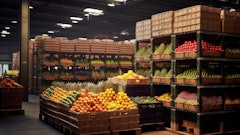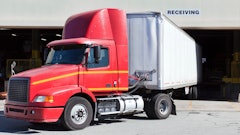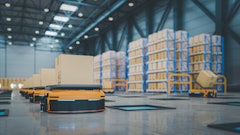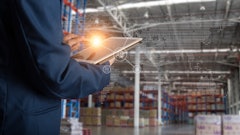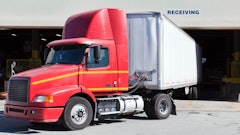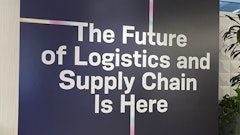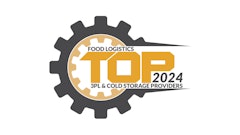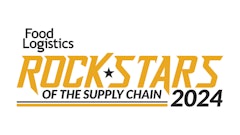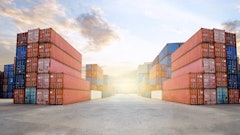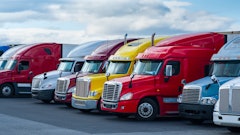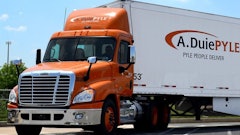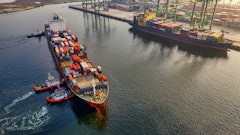In the food industry, there are tell-tale signs that it might be worthwhile to at least consider outsourcing some supply chain functions to a third-party logistics provider (3PL).
To put it in the most basic of terms, customers will judge a company by how well its supply chain operates. "If you're getting an inordinate number of complaints about deliveries, product damage, errors, products arriving late, etc., and you've tried to make corrections but have not been able to resolve the problems, it may be time to look for a 3PL," says Aaron Miller, a principal with Raleigh, NC-based Tompkins Associates.
But, by that point, it might already be too late. When it comes to outsourcing, timing is everything, and a number of industry insiders agree that companies should especially look at their supply chains at a time of strong corporate growth and expansion into new markets. A company needs to know when its existing supply chain can no longer keep up with its rapid growth before customer service starts to deteriorate, not after, they say.
"As your market expands, it gets more expensive to ship to all your customers. You want to be able to move your central shipping points to your customers, and that is costly in terms of facilities and transportation," says Bill Tyng, a supply chain systems consultant at Forte Industries, Cincinnati.
On top of that, it could become difficult to predict just how much warehouse space the company will need from year to year. One year might see the need for 50,000 square feet of space, the next year could see 100,000, and the year after that could see a drop to 40,000.
That was a problem experienced by Red Bull North America, the energy drink maker. As the company grew, it looked at its logistics operations and decided recently that it was time to turn over its entire supply chain to Ozburn-Hessey Logistics, a 3PL based in Nashville, TN.
"Red Bull needed a premium logistics provider to help us achieve supply chain strategies," says Rob Steere, its director of operations. "We are experiencing explosive year-over-year growth rates. These growth rates are exciting, however, it makes forecasting your warehouse space requirements more challenging."
For that very reason, one of the primary attributes Red Bull sought in a 3PL partner was scalability. "OH Logistics makes it possible for Red Bull to leverage their national network of multi-client warehouses to flex with our space needs," Steere says.
Red Bull's decision to outsource at that moment in time is not uncommon. "Often, the decision to outsource is simply a location thing," says Bruce Meyers, vice president of Nebraska Warehouse and president of its LTL and truckload carrier Cannonball Express Transportation Co., both in Omaha, NE. "A small food company is located in Chicago and it just got business in Omaha. That's too far away for the company to handle it itself, and it may not be worth it to build a new operation there just for one customer."
When you've reached that point, you need to "do a network analysis to determine if you have the right number of facilities, if they are in the right locations, and if you have the right linkages between your suppliers, stores and other DCs," ad'vises Tom Sanderson, president and COO of Transplace, Plano, TX.
And when a company's strong growth takes it to international markets, it may be even more important to have a 3PL on board to handle the logistics. "You especially want to outsource anything international," says Richard Armstrong, president of 3PL consulting firm Armstrong & Associates, Stoughton, WI.
There are many 3PLs that specialize in international transportation management, he notes, citing very different cultures and languages, political and economic factors, building and labor issues, storage measurements and pallet sizes, insurances, customs regulations, border crossings, ocean and air freight handling and a whole lot more, as reasons to let a 3PL handle global logistics. "To some degree, you want to find one 3PL company that can integrate all the functions that go with it for you," Armstrong says.
With growth, though, often comes the need for changes in employees, facilities, material handling systems, IT, technology and more. Prior to any changes in these areas, it would make absolute sense for companies to explore furloughing their distribution operations and hiring a 3PL, say the experts.
Among these factors, labor is usually the most important. In the course of negotiating a new contract or a contract extension with existing employees, "you may get the word that your workforce is feeling overworked. As you look at how you can fix that, it may mean simply bringing on more people or additional shifts," Forte's Tyng says, "or that may be the time to start exploring your 3PL options."
In fact, the labor issue is one of the major factors leading the charge toward 3PLs, observes Richard Kochersperger, director of the Food Marketing Group in Wallingford, PA, and a professor of food marketing at St. Joseph's University in Philadelphia. "Human resources costs, like healthcare, benefits and taxes, are going up. Healthcare costs alone are going up 40 percent a year. With a 3PL, that's a controlled cost," he says.
"It's usually an earth-shaking situation within a company, but it can be a matter of cost; better use of manpower, equipment and technology; uncovering business restraints, like labor agreements or geographies; or just an opportunity to free up capital," says Bob Poduch, vice president of business development at Transervice Logistics, Des Plaines, IL.
Merger Mania
And while the experts agree that it is a good idea to benchmark your logistics operations against the 3PLs every few years, some companies are hit with a situation that requires more immediate action. The Food In-stitute in Elmwood Park, NJ, recorded 351 mergers and acquisitions within the food industry in 2004. For many, that is the starkest of realities that it is time to look at outsourcing, and time is of the essence.
Such was the case for drink maker Sunny Delight, based in Cincinnati. Its parent company, Procter & Gamble, put the company on the block in May of last year and wanted to transfer ownership by August. After that, it had six months to divest itself from P&G entirely.
Sunny Delight operated its own plants and warehouses in New York, Georgia, Texas and California, but had relied on P&G's extensive in-house supply chain capabilities to move its products to its customers. It was sold to Boston-based private equity firm J.W. Childs Associates, a firm which certainly had no logistics infrastructure in place.
"P&G did our transportation management, and now we would not have the logistics functions that came with being a part of such a large company," says Jim Glendon, Sunny Delight's supply chain manager. "We looked at what logistics capabilities and staff we had in house and decided it was a function we did not want to develop ourselves. We wanted to concentrate on building our business away from P&G and did not want to have to develop the function ourselves.
"We asked ourselves what skill sets we had. We couldn't find people in such short time and bring them into the fold. We had four warehouses, but no trucks. There would have been too much involved in trying to acquire IT, assets, etc. It also would have meant bringing in ordering systems."
So, in November, Sunny Delight selected Transplace to handle all outbound freight. The 3PL also negotiates contracts for Sunny Delight with a core group of refrigerated carriers, handles freight payments and arranges loading appointments for customer pickups.
"It was a thorough process, and our selection was based on cost, demonstrated results, clients, ease of startup and scale," Glendon says. "It's been working out very well. We had contracts in place with our carriers and started up Feb. 1 without any real issues at any of our plants. Transplace has been right on with all our targets."
Core Competency Focus
Sunny Delight's situation is not unique under those conditions. Con'sultants at Tompkins Associates "see a lot of interest in outsourcing when there is an administrative change within an organization," says Miller. "The organization was comfortable working within its own supply chain, but now there's a shakeup and the new leaders are trying to further maximize delivery to customers," he relates.
Just ask BI-LO and Bruno's Super'markets, based in Mauldin, SC. Both chains were sold off recently by Royal Ahold to Lone Star Funds, Dallas, and, as part of the reorganization that followed, the chains transferred ownership of three warehouses and all their distribution and replenishment functions to 3PL C&S Wholesale Grocers, Keene, NH.
"After a careful and comprehensive analysis of our business performance and future prospects, we have developed a plan that is designed to make our company more efficient by reducing costs and more responsive by simplifying the way we do business," explains Dean Cohagan, president and CEO of BI-LO and Bruno's. "The plan is also aimed at focusing our efforts and resources more sharply on what we do best—operating great supermarkets and providing exceptional customer service."
Outsourcing its supply chain functions, he says, "will enable our business to focus our efforts on our core retailing activities and allow us to free up capital to reinvest in store development and systems."
But, whether the changes are minor or major, they have led to another trend that is emerging in the 3PL arena—companies bringing on a 3PL for a much shorter term. Previously, most 3PLs required long-term contracts, but now, many more are signing on for the short haul. Nebraska Warehouse's Meyers, for ex'ample, sees "a lot of companies that go back and forth" between outsourced logistics and running them in house. "They have a management change, huge employee turnover or other economic impacts, and need someone just to get them through the transition," he says.
Adds Forte's Tyng, the decision to outsource often depends on the level of changes being made. "If you're bringing in new systems across the enterprise, you may choose to outsource some functions rather than putting in the expense, or you can [outsource] for a year or two until you get your processes back up to speed "
The Whens Of Outsourcing
According to Tom Sanderson, president and COO of Transplace, Plano, TX, companies may need to consider outsourcing:
- If transportation rates are getting too high;
- If you own your own fleet and it is running a high number of empty miles;
- If your customers are complaining about your service, such as on-time delivery, damage, lack of visibility, etc;
- If many of your processes are manual and you need to upgrade them, but do not have the resources to do so;
- If you're still calling carriers by phone, and you can't do track and trace; and
- If you are about to embark on capital expenditures for a new facility or to upgrade systems and software.
3PLs Posted Strong Gains in 2004
Total revenue for U.S. third-party logistics providers (3PLs) rose to $89.4 billion in 2004, showing an increase of 16.3 percent, according to new research by Armstrong & Associates, Stoughton, WI.
According to Armstrong, 3PLs have seen a total growth of 14.2 percent since 1996. That growth has been fueled by international transportation management, especially in product movements into the United States. Domestic transportation management also showed 16.8 percent growth, reaching $25 billion. The dedicated contract carriage market reached a new high of $8.7 billion in 2004. In value-added warehousing and distribution, 3PLs experienced 7 percent growth in 2004, and 15.3 percent growth since 1999.



